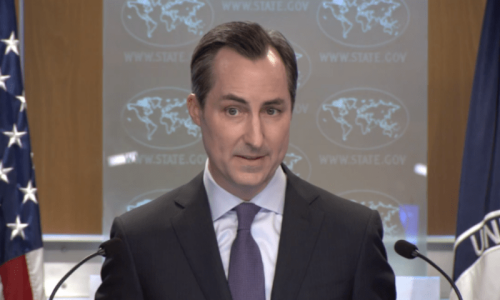KARACHI: It is like a very busy train station with so many people waiting around sitting against the walls with their belongings. The plight of those waiting like this outside the big government hospitals cannot be expressed easily. Unlike those at railway stations where despite having to wait you encounter smiles on faces with a light in the eyes, here you see despair and sadness on every face.
One young man with a shawl tightly wrapped around himself sits on another thick chador that he has spread over the hard road in front of the new SMBB Trauma Centre of Dr Ruth K.M. Pfau Civil Hospital. One of his eyes is swollen and red but surprisingly he is not a patient waiting for his number. Moosa Kalim is there for his father, Gul Mohammad, who is admitted to the trauma centre following a head injury in an accident at Hub Chowki. “Only one attendant at a time is allowed in with him, and that also for very little time. So I am waiting here with my uncles,” he says. “There are no big hospitals like this one in Balochistan, so here we are. We can’t come and go from so far away every day.”

A little ahead outside the children’s wards in the main hospital, there are some three cement benches and hundreds of worried parents. Murad Bibi is also there from Balochistan. From Uthal, Lasbela. Her one-and-a-half-year-old boy has been diagnosed with brain TB and is in a coma. She is living outside the children’s wards, on the footpath. “There are no bathrooms for us attendants, no water to drink to clean ourselves as we wait for word about our child’s condition,” she says sadly.
Mohammad Bilal from Shershah, who is also occupying some space on the same narrow footpath, listens to the conversation and has his own complaint to add to it. “I only got up to see my daughter and was gone for a few minutes from this place only to return to see my blanket gone. Someone just took it away,” he says. “But with so many like us waiting here for our sick family members, it must have been someone in need of a blanket I am sure who resorted to stealing like this.”

A little further away there is a vending machine with snacks such as packets of potato crisps, chocolate bars, juice, cold drinks and water. But there are people only looking at the things on offer beyond the glass door of the machine. They don’t know how to work it.
Thankfully, there are NGOs at hand offering stretchers and wheelchairs that people can borrow. Had it not been for them and the patient aid societies, it would have been complete hell.
Suddenly, there is more chaos. Whenever motorcycles, ambulances and even container trucks drive in, everyone runs helter-skelter to make way for them to pass. Does anyone notice that the rickshaws carrying patients here also outnumber the ambulances?

And in all this you can’t miss those long queues outside the windows that supposedly fill prescriptions. There are separate lines for diabetic patients, for women, men, elderly and disabled and what not. But do they all get medicines? “They give some of them but for some they also say that they are all out,” says a father trying to read an English prescription.
This was the story at Dr Ruth Pfau Civil Hospital. At the Jinnah Postgraduate Medical Centre things were quite different as there was no despair on the faces of the patients and attendants. Everyone was moving and knew exactly where they were going. Still, one noticed the dilapidated condition of some wooden benches, which require attention. Also they need to get proper trolleys to carry or shift medical supplies and equipment. Using wheelchairs to carry stuff is no way, really.
Published in Dawn, January 27th, 2019












































